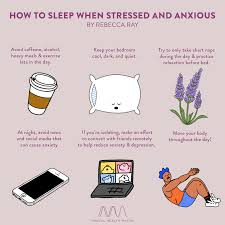Anxiety at Night: Understanding and Managing Nighttime Anxiety
Many people experience anxiety at night, which can disrupt their sleep and impact their overall well-being. Nighttime anxiety can manifest in various ways, such as racing thoughts, restlessness, physical tension, and feelings of fear or unease.
There are several factors that may contribute to anxiety at night:
- Stress: The stress of the day can often intensify at night when we are trying to wind down and relax.
- Overthinking: Nighttime is when our minds tend to wander and ruminate on worries and concerns.
- Loneliness: Feelings of loneliness or isolation can be heightened at night when there are fewer distractions.
- Physical discomfort: Physical discomfort such as pain or illness can exacerbate feelings of anxiety when trying to sleep.
To manage anxiety at night, it is important to develop healthy bedtime routines and coping strategies. Here are some tips to help you cope with nighttime anxiety:
- Practice relaxation techniques: Deep breathing, progressive muscle relaxation, or meditation can help calm your mind and body before bed.
- Avoid screens before bedtime: The blue light emitted from screens can disrupt your sleep-wake cycle. Try to limit screen time before going to bed.
- Create a comfortable sleep environment: Make sure your bedroom is conducive to sleep – cool, dark, and quiet.
- Write down your worries: Keep a journal by your bedside to jot down any anxious thoughts that come up at night. This can help you release them from your mind.
- Talk to a therapist or counselor: Seeking professional help can provide you with tools and strategies to manage nighttime anxiety effectively.
If you find that nighttime anxiety is significantly impacting your quality of life, don’t hesitate to reach out for support. Remember that you are not alone in experiencing anxiety at night, and there are resources available to help you navigate through it.
Understanding and Managing Nighttime Anxiety: Answers to Common Questions
- What causes anxiety at night?
- How can I stop my mind from racing at night?
- Why do I feel more anxious at night?
- What are the symptoms of nighttime anxiety?
- Can anxiety cause insomnia?
- What are effective ways to manage anxiety at night?
- When should I seek professional help for nighttime anxiety?
What causes anxiety at night?
Anxiety at night can be caused by a variety of factors, including heightened stress levels, overthinking and rumination, feelings of loneliness or isolation, physical discomfort such as pain or illness, and the general quietness and lack of distractions that nighttime brings. The transition from a busy day to a more relaxed state can often amplify existing worries and fears, making them more prominent when trying to wind down for sleep. Understanding these potential triggers can help individuals better manage and address their nighttime anxiety for improved well-being and restful sleep.
How can I stop my mind from racing at night?
Many individuals struggle with the common question, “How can I stop my mind from racing at night?” Racing thoughts can be a significant challenge when trying to unwind and fall asleep. To address this issue, it’s essential to establish calming bedtime routines, such as practicing relaxation techniques like deep breathing or meditation. Engaging in activities that promote mental clarity and relaxation before bed can help quiet the mind and create a more peaceful environment for sleep. Additionally, journaling thoughts or concerns before bedtime can be a helpful way to offload worries and prevent them from racing through your mind at night. Finding what works best for you in managing nighttime racing thoughts is key to improving your sleep quality and overall well-being.
Why do I feel more anxious at night?
Many individuals find themselves feeling more anxious at night due to a combination of factors that can intensify during the evening hours. The quiet and stillness of the night can create a space for worries and concerns to surface, as there are fewer distractions to keep the mind occupied. Additionally, nighttime often marks the end of a busy day, allowing unresolved stressors and anxieties to come to the forefront when trying to wind down. This heightened state of awareness can lead to racing thoughts and increased feelings of unease, making it challenging to relax and fall asleep. Understanding these triggers and implementing calming bedtime routines can help manage nighttime anxiety effectively.
What are the symptoms of nighttime anxiety?
Nighttime anxiety can manifest in various symptoms that can disrupt sleep and impact overall well-being. Common symptoms of nighttime anxiety include racing thoughts, excessive worry, restlessness, difficulty falling asleep or staying asleep, physical tension or discomfort, increased heart rate, sweating, and feelings of fear or unease. These symptoms can vary in intensity from mild to severe and may lead to a cycle of poor sleep quality and heightened anxiety. Recognizing these symptoms is the first step in addressing nighttime anxiety and seeking appropriate support and coping strategies.
Can anxiety cause insomnia?
Anxiety can indeed cause insomnia, as the persistent worry, fear, and restlessness associated with anxiety can make it difficult to fall asleep or stay asleep throughout the night. The heightened state of alertness and racing thoughts that often accompany anxiety can interfere with the body’s natural ability to relax and enter into a restful sleep. This disrupted sleep pattern can exacerbate feelings of anxiety, creating a cycle where anxiety leads to insomnia, and lack of sleep further intensifies anxiety symptoms. It is essential to address both the underlying anxiety issues and the resulting insomnia to break this cycle and improve overall well-being.
What are effective ways to manage anxiety at night?
Effective ways to manage anxiety at night include implementing relaxation techniques such as deep breathing exercises or meditation to calm the mind and body before bedtime. Creating a comfortable sleep environment that is cool, dark, and quiet can also help alleviate nighttime anxiety. Additionally, avoiding screens before bedtime and writing down worries in a journal can aid in releasing anxious thoughts. Seeking support from a therapist or counselor can provide valuable tools and strategies to effectively manage nighttime anxiety and improve overall sleep quality.
When should I seek professional help for nighttime anxiety?
If you find that nighttime anxiety is persistently disrupting your sleep, affecting your daily functioning, or causing significant distress, it may be time to seek professional help. Professional assistance for nighttime anxiety can be beneficial when your coping strategies are not providing relief, when the anxiety is interfering with your overall well-being and quality of life, or when you are experiencing physical symptoms such as insomnia or chronic fatigue. A mental health professional can offer personalized guidance, support, and treatment options to help you better manage and alleviate nighttime anxiety. Remember that seeking help is a proactive step towards improving your mental health and overall well-being.


